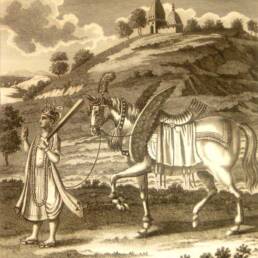As a child, perhaps you vividly recall the red grammar book that graced your school desk. Yes, the famous “High School English Grammar and Composition” by Wren & Martin. But did you know that one of its creators also inspired a Hollywood film banned by Mussolini? A thread.
P.C. Wren’s work, along with his co-author H. Martin, became a cornerstone of English language education in India and Pakistan, offering a comprehensive guide to mastering the complexities of grammar. But what about the man behind the pages of the book?
Born Percival Christopher Wren in 1875, in the East End of London to a school teacher, his life’s journey took him across continents and through myriad experiences. And, to say the least he is a man of mystery.
Following his completion of a Master of Arts degree, he engaged in various occupations such as selling fruits, boxing at fairgrounds, and potentially serving a brief term in the legion before entering the Indian Education Service in 1903.
As fate would have it, Wren’s journey led him to the Indian subcontinent, where he embarked on a new chapter of his life. He assumed the role of a headmaster at Karachi High School, and even taught at a teachers’ training college.
Later he joined schools in Bombay and Poona. It was during his time in India that he penned his most popular grammar book in 1935. Initially crafted for the children of British officers, the book became a staple in classrooms in Indian & Pakistani schools in post-colonial era.

But there’s a twist in this tale that takes us beyond the realm of grammar and into the glitz and glamour of Hollywood. P.C. Wren’s literary genius extended beyond the confines of pedagogy; it embraced the world of fiction.
While in Indian school service, he also penned a series of adventure novels set against the backdrop of the French Foreign Legion – tales that would go on to inspire not one, but multiple Hollywood movies.
Wren’s magnum opus, the “Beau Geste” series, delves into the world of honour, loyalty, and camaraderie, capturing the essence of human emotions against a canvas of sand and struggle, and of course with a generous chunk of colonialist chauvinism.
The tales of brave men and the enigmatic allure of the Foreign Legion captured the imagination of western filmmakers, leading to adaptations that breathed life into Wren’s literary creations.
With his precise descriptions of Legion uniforms, training, and equipment, coupled with his enigmatic persona and gaps in documenting his life, many speculate that Wren himself served in the French Legion, given his accurate fictional depictions.
But, now it’s widely believed that he crossed paths with legionnaires in French North Africa during his travels, skillfully weaving their tales with his brief service memories. Regardless, “Beau Geste” became a massive hit.
In 1926, the captivating book found its way to Hollywood with “Beau Geste,” a silent drama film directed by Herbert Brenon. A remake followed in 1939, hailed as the finest adaptation of the story.
Directed by Academy Award-winning director William A. Wellman, the movie starred stalwarts like Gary Cooper and Ray Milland, delivering a riveting action spectacle of the finest calibre. But there was a twist.
The cinematic gem was deemed too dangerous for dictators. It was banned by Mussolini’s regime in Italy for showcasing British valour and undermining fascist doctrine. Franco’s Spain followed suit soon.
However, legend has it that after General Franco’s triumph in the civil war, he immersed himself in once forbidden American and British films. Among them, “Beau Geste” left an indelible mark on him, etching a lasting memory. Quite a story.
A journey that spans from a school classroom to Hollywood, through the corridors of power where dictators wielded their authority – the tale of this unassuming little red grammar book and its co-creator weaves a tapestry of intrigue and mystique that is hard to beat.
Sources
Martin Windrow, Our Friends Beneath the Sands: The Foreign Legion in France’s Colonial, Orion
Delphi Complete Works of P. C. Wren (Illustrated), Delphi Classics




